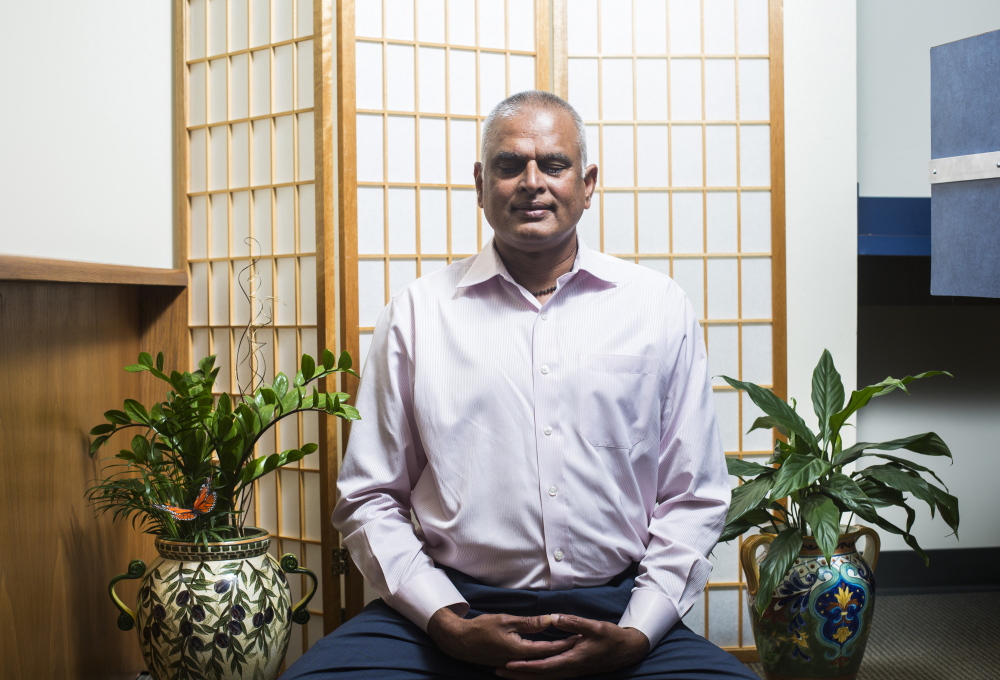Meetings are often a dreaded, but unavoidable, requisite in the workplace. They can be stressful and often peoples’ minds drift away from the task at hand to other things, like the work waiting for them at their desks.
About three years ago, Ashok Nalamalapu, who runs iCST, an IT company in South Portland, noticed that the energy at the weekly status meetings was often tense and that what should have been polite discussions sometimes devolved into arguments. He decided to try something new. To center the group before starting the meeting, Nalamalapu offered a short and optional period of meditation.
Nalamalapu has practiced meditation for the past 16 years. He started meditating for only five minutes at a time. Now he practices 30 minutes in the morning and 30 minutes in the evening. The benefits, both personal and professional, have been boundless, he said.
“When you just quiet down, we listen, we respect and think before we respond,” Nalamalapu said. “So I wanted to leverage what I was experiencing personally – I wanted to share that with the group.”
After he began guiding his employees through two minutes of meditation, he felt a shift in the meetings.
“The tone was different,” he said. “It made our meetings go smoother because they’re not arguments. They’re discussions. You respect others and you listen even if you don’t agree with their ideas or philosophy or approach.”
Nalamalapu may be onto something. Research has shown that meditation can help people be more focused, reduce stress, and make better business decisions. One Dutch study found that meditation can make people more creative, something else Nalamalapu said he’s noticed since he began leading employees in short meditations. Companies such as General Mills, Google and Intel have incorporated meditation into their offices to help workers cope with stress and the mind-numbing deluge of information they’re exposed to on a daily basis.
Though meditation, and the squishier term “mindfulness,” are becoming more mainstream, especially in places like Silicon Valley, there’s still a stigma attached to meditation that it’s a religious practice. It doesn’t have to be, Nalamalapu said.
“You don’t have to meditate to realize God or the ultimate truth, but meditate for well-being and productivity,” he said.
When he began offering meditation at iCST, he didn’t impose it on his employees ( it would be illegal to do so). He offered it as an option and made sure not to talk about it in religious terms. Still, one newly hired employee felt uncomfortable enough that she quit, Nalamalapu said. Besides that isolated incident, other employees gave meditation a shot.
CLEARING THE MIND
“Meditation was a new concept to me when I started at iCST,” said Christina James, an account manager and senior IT recruiter. “I have found meditation to be a useful tool that allows me the opportunity to clear my mind and become more focused.”
Julie Tanner, iCST’s office manager, had never meditated before she started doing so at the office.
“The practice of meditation at work on Monday mornings allows me to clear my mind and then come in to focus for the meeting,” she said. “I now think of these minutes spent as a calm way to start my week, which is both busy at home and here at iCST.”
There are excuses for why meditation in the workplace is unfeasible, like the office is too noisy, but Nalamalapu dismisses that notion.
“Meditation is something you need to be able to do in the stock market or on Main Street,” he said. “Eventually you meditate wherever you are. Now I am practicing meditation while keeping my eyes open, which is very beautiful.”
Others say they’ve tried it before and can’t keep their mind quiet, which is missing the point of meditation.
“Thoughts come and thoughts go. Just observe the thoughts just like the clouds coming and going,” he said. “They don’t have to avoid thoughts or be mad at thoughts. Just let them go. They can be friends.”
More meditation in the workplace wouldn’t just benefit the workers. Employers would benefit too from more effective and happy employees, Nalamalapu said.
“They’ll be more profitable, more productive,” he said. “They’ll be more creative. They will take more risks. They’ll be more courageous. They will be more helpful. They’ll be more happier. And they’ll have better relationships with others, both at home and at work.”
Send questions/comments to the editors.



Success. Please wait for the page to reload. If the page does not reload within 5 seconds, please refresh the page.
Enter your email and password to access comments.
Hi, to comment on stories you must . This profile is in addition to your subscription and website login.
Already have a commenting profile? .
Invalid username/password.
Please check your email to confirm and complete your registration.
Only subscribers are eligible to post comments. Please subscribe or login first for digital access. Here’s why.
Use the form below to reset your password. When you've submitted your account email, we will send an email with a reset code.